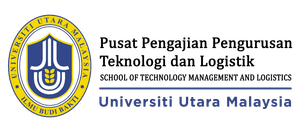THE IMPACT OF TECHNICALLY-ORIENTED LEAN PRODUCTION PRACTICES ON OPERATIONAL PERFORMANCES IN MALAYSIAN MANUFACTURING INDUSTRIES
DOI:
https://doi.org/10.32890/jtom2017.12.1.7Keywords:
Lean production practices, operational performance, quality at source, just-in time, flow system, technology & innovationAbstract
The primary purpose of this paper is to investigate the relationships between technically-oriented lean production practices and operational performance in Malaysian manufacturing industries. Grounded by the Socio-technical System Theory and the Program Theory, this study formulates and examines a conceptual model that links technically-oriented lean production practices and operational performance. This study utilizes two hundred and five manufacturing companies, selected randomly from the Federation of Malaysian Manufacturers Directory. The study measures senior production or lean managers’ perception of the lean production practices and the level of operational performances in their companies. This study applies SPSS package for data analysis. The result indicates that technically-oriented lean production practices namely quality at source, just-in time, flow system and technology & innovation are significantly associated with the operational performance of the companies. This study presents empirical evidence in the field of management, particularly in the context of operations management. The findings would further enrich the existing knowledge in this field. Finally, this study would provide useful guidance for the managers to plan and maintain lean production in the organization as well as to generate new measures of lean production in order to enhance operational performance at the company level.
Metrics
References
Arawati, A. 2011. Supply chain management, supply chain flexibility and business performance. Journal of Global Strategic Management, 09, 134-145.
Avittathur, B. & Swamidass, P. 2007. Matching plant flexibility and supplier flexibility: lessons from small suppliers of U.S. manufacturing plants in India. Journal of Operations Management, 25(3), 717–735.
Callen, J.L., Fader, C. & Krinsky, I. 2000. Just-in-time: a cross-sectional plant analysis. International Journal of Production Economics. 63(3), 277–301.
Cua, K. O., McKone, K. E. & Schroeder, R. G. (2001). Relationships between implementation of TQM, JIT, and TPM and manufacturing performance. Journal of Operations Management, 19(2001), 675-694.
Ferdousi, F. & Ahmed, A. (2009). An investigation of manufacturing performance improvement through lean production: A study on Bangladeshi garment firms. International Journal of Business and Management, 4(9), 106-116.
Li, S., Ragu-Nathan, B., Ragu-Nathan, T. S. & Subba Rao, S. (2006). The impact of supply chain management practices on competitive advantage and organizational performance. The International Journal of Management Science, 34(2006), 107-124.
Liker, J. K. (2004). The Toyota Way - 14 Management Principles form the World’s Greatest Manufacturer. McGraw-Hill. New York. NY.
Katayama, H. & Bennett, D. (1996). Lean production in a changing competitive world: a Japanese perspective. International Journal of Operations & Production Management, 16(2), 8-23.
McKone, K.E., Schroeder, R.G. & Cua, K.O. 2001. The impact of total productive maintenance on manufacturing performance. Journal of Operations Management, 19(1), 39–58.
Pham, D.T., Pham, P.T.N. & Thomas, A. (2008). Integrated production machines and systems – beyond lean manufacturing. Journal of Manufacturing Technology Management, 19(6), 695-711.
Rehder, R. R. 1989. Japanese transplants: in search of a balanced and broader perspective. Columbia Journal of World Business, 24(4), 17-28.
Rogers, P. J., Petrosino, A., Huebner, T. A. & Hacsi, T. A. 2000. Program theory evaluation: practice, promise, and problems. In T. A. Hacsi (Ed.), Program theory in evaluation: Challenges and opportunities. Jossey-Bass, San Francisco.
Shah, R. & Ward, P. T. (2003). Lean manufacturing: context, practice bundles, and performance. Journal of Operations Management, 21, 129–149.
Shah, R. & Ward, P. T. (2007). Defining and developing measures of lean production. Journal of Operations Management, 25, 785-805.
Womack, J., Jones, D. & Roos, D. (1990). The Machine that Changed the World: The Story of Lean Production. Harper, New York, NY.
Wong, Y. C., Wong, K. Y. & Ali, A. (2009). A study on lean manufacturing implementation in the Malaysian electrical and electronics industry. European Journal of Scientific Research, 38(4), 521-535.
Downloads
Published
How to Cite
Issue
Section
License
Disclaimer
The Journal of Technology and Operation Management (JTOM) has taken all reasonable measures to ensure that material contained in this website is the original work of the author(s). However, the Journal gives no warranty and accepts no responsibility for the accuracy or the completeness of the material; no reliance should be made by any user on the material. The user should check with the authors for confirmation. Articles published in the Journal of Technology and Operation Management (JTOM) do not represent the views held by the editors and members of the editorial board. Authors are responsible for all aspects of their articles except the editorial screen design.














